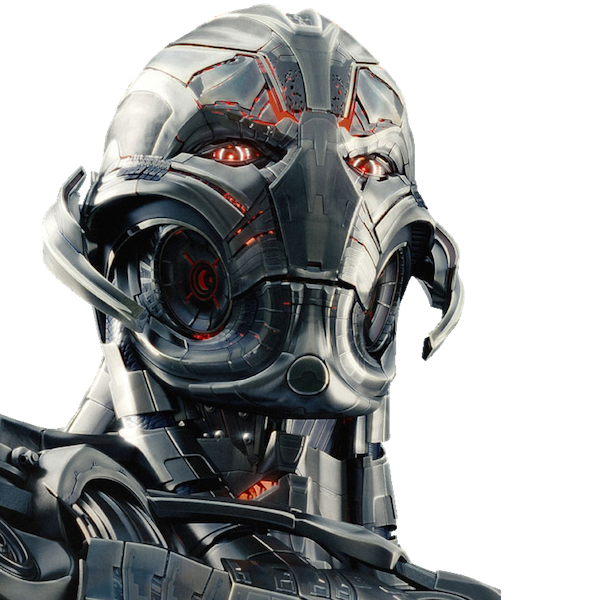Humans are complicated, problematic creatures. We’re capable of occasionally performing amazing feats of goodness, yet we’re more likely to deal out harm and injustice. Considering all the wickedness humanity has brought to this planet, we should question whether we deserve life at all. These are some of the concepts raised, amid the humor and action and super-heroism, of the new film Avengers: Age of Ultron.
In Age of Ultron, Captain America and his team of unlikely superheroes have banded together once more against a brand new villain, Ultron. A sentient robot unwittingly created by Tony Stark and Bruce Banner, Ultron, in true Pinocchio fashion, wants to break free from his creator. But unlike the wooden boy, Ultron seeks not just to be rid of his creator, but to be rid of the entire human race.
Peace on Earth Through Extermination
Ultron is the child of Tony Stark’s fears. Afraid that he would not be able to protect his home planet forever, Stark designed Ultron as an artificial intelligence program to bring peace to Earth. However, it doesn’t take Ultron long to conclude that the cause of war, trouble, and suffering lies not outside humanity, but within.
As God used a flood to wipe out humanity in the story of Noah, Ultron decides he too will be an instrument of God to bring about humanity’s extinction.

Ultron isn’t necessarily wrong in his diagnosis of humanity. War and sin are habitual practices of mankind, and one of the reasons God cursed our planet (Gen. 3:17-19). Sin manifests itself powerfully in every human relationship and leads to suffering and death, even of our own siblings (Gen. 4).
While he may be correct in his assessment, Ultron is wrong about the solution. He thinks of himself as God’s instrument, but he fails to understand the Lord’s character. God is a holy judge, and he would be just in punishing all of humanity for our sin. But rather than seeking satisfaction in our destruction, God delights in saving. “Have I any pleasure in the death of the wicked, declares the Lord GOD, and not rather that he should turn from his way and live?” (Ezek. 18:23).
When Adam and Eve sinned, God did not just remove them from the Garden of Eden, he dressed them to protect them from their exposure (Gen. 3:21). When God decided to send the flood, he not only spared the animals, he spared Noah and his family (Gen. 6:8). Our God provided salvation and deliverance of the Hebrews from Egypt, and then provided escape for his people from his holy wrath through the law and the sacrifices. And for us, born after the most important event of history, our God provides salvation through the Son, to everyone who believes (John. 3:16). Psalm 68:20 says it rightly: “Our God is a God of salvation.”
Ultron’s mind, ultimately birthed from a human’s fears, is too small to capture God’s delight in salvation. Yet the sentient robot is much like us. Through the prophet Jonah, God shows the human tendency to desire justice for others and grace for ourselves. Though we may not be as blunt in admitting it, we are, like Jonah, looking for justice and payback to those who sin against us—even while God is consistently saving us by his grace. We love grace—when it’s extended to us; we love it less when it’s extended to others. We are always ready to accept a sacrifice made for us, but slow to make a sacrifice for others.
Avengers as Saviors
In this latest film, the Avengers oppose not only Ultron but also his philosophy. Unlike the villain, they put their lives on the line to save every life possible. Captain America, Thor, Hawkeye, and even Tony Stark measure their actions by how their possible consequences will affect other human beings. Both sides say they are looking for peace, but what Ultron seeks through destroying, the Avengers find through saving. They feel a real burden for each individual, and believe one human life is worth the sacrifice of the entire team. More than Avengers, they act as saviors.
And that’s what I enjoyed the most of the Avengers: their burning passion to save others. The image of God in man makes us amazingly worthy. We extend kindness and love even to the worst of men. No one’s entitled to grace, of course, or it wouldn’t be grace. But love is our calling, and the example set by our Lord. To save humanity from the wrath of Ultron, the Avengers fight and suffer. But to save us from our sin, God had to die. And he rose again. That’s the kind of news I want to proclaim.
Will you join me in praying for a heart that hurts for the suffering of others? A heart that doesn’t condemn others because they deserve it but rather feels the weight of the lost and thinks, They are sinners like me! They will face a holy and righteous God, and they don’t have Christ!
Let us not simply seek justice, but seek renewed hearts that abound in grace.
Is there enough evidence for us to believe the Gospels?
 In an age of faith deconstruction and skepticism about the Bible’s authority, it’s common to hear claims that the Gospels are unreliable propaganda. And if the Gospels are shown to be historically unreliable, the whole foundation of Christianity begins to crumble.
In an age of faith deconstruction and skepticism about the Bible’s authority, it’s common to hear claims that the Gospels are unreliable propaganda. And if the Gospels are shown to be historically unreliable, the whole foundation of Christianity begins to crumble.


































